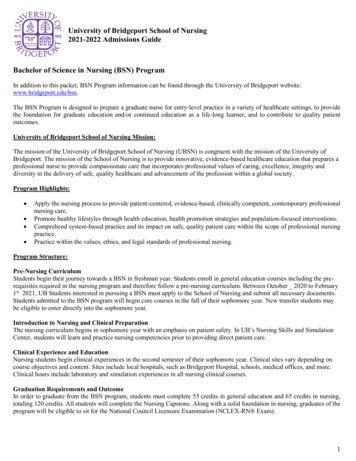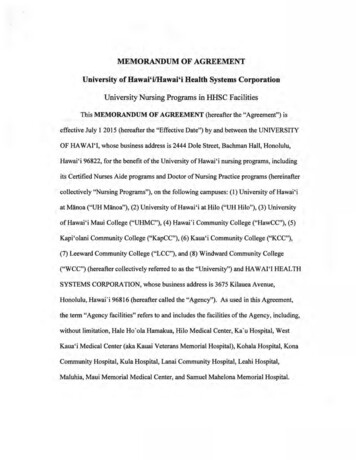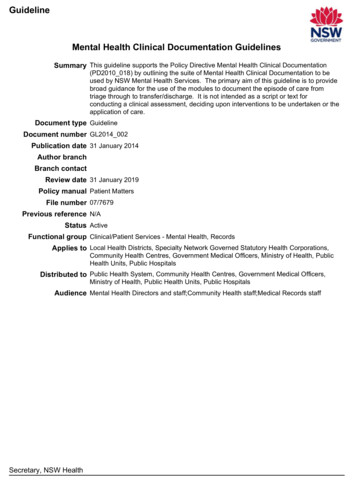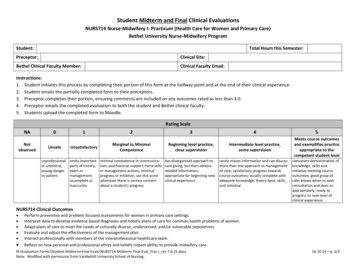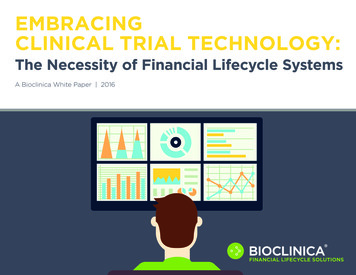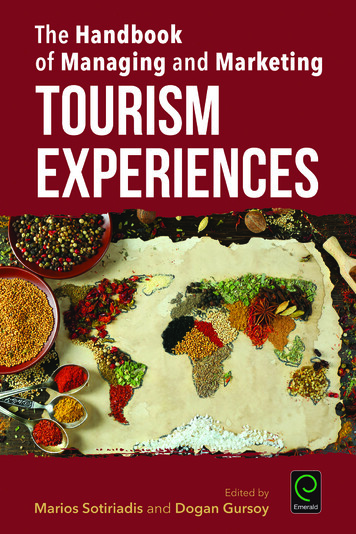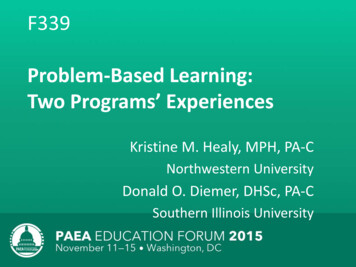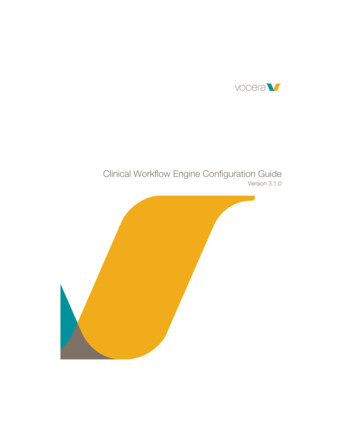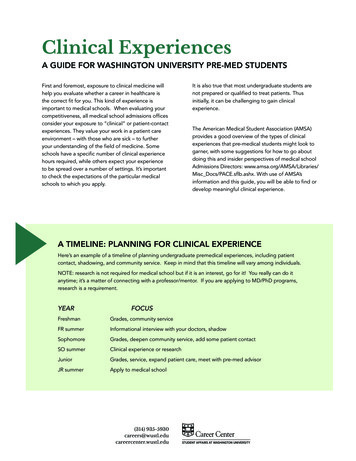
Transcription
Clinical ExperiencesA GUIDE FOR WASHINGTON UNIVERSITY PRE-MED STUDENTSFirst and foremost, exposure to clinical medicine willhelp you evaluate whether a career in healthcare isthe correct fit for you. This kind of experience isimportant to medical schools. When evaluating yourcompetitiveness, all medical school admissions officesconsider your exposure to “clinical” or patient-contactexperiences. They value your work in a patient careenvironment – with those who are sick – to furtheryour understanding of the field of medicine. Someschools have a specific number of clinical experiencehours required, while others expect your experienceto be spread over a number of settings. It’s importantto check the expectations of the particular medicalschools to which you apply.It is also true that most undergraduate students arenot prepared or qualified to treat patients. Thusinitially, it can be challenging to gain clinicalexperience.The American Medical Student Association (AMSA)provides a good overview of the types of clinicalexperiences that pre-medical students might look togarner, with some suggestions for how to go aboutdoing this and insider perspectives of medical schoolAdmissions Directors: www.amsa.org/AMSA/Libraries/Misc Docs/PACE.sflb.ashx. With use of AMSA’sinformation and this guide, you will be able to find ordevelop meaningful clinical experience.A TIMELINE: PLANNING FOR CLINICAL EXPERIENCEHere’s an example of a timeline of planning undergraduate premedical experiences, including patientcontact, shadowing, and community service. Keep in mind that this timeline will vary among individuals.NOTE: research is not required for medical school but if it is an interest, go for it! You really can do itanytime; it’s a matter of connecting with a professor/mentor. If you are applying to MD/PhD programs,research is a requirement.YEARFOCUSFreshmanGrades, community serviceFR summerInformational interview with your doctors, shadowSophomoreGrades, deepen community service, add some patient contactSO summerClinical experience or researchJuniorGrades, service, expand patient care, meet with pre-med advisorJR summerApply to medical school(314) 935-5930careers@wustl.educareercenter.wustl.edu
Clinical Experiences2SKILLS GAINED OR DEVELOPED THROUGH CLINICAL EXPERIENCE Teamwork. Modern medicine takes placeprimarily in a team approach, so it’s important togain experience observing and working collaboratively with others. Decision making. It’s one thing to decide in theory;it’s another to watch medical professionals use theirbest judgment on the spur of the moment. Andhear their thoughts as they reflect afterwards. Empathy. Being able to relate well with patientsand families is the heart of excellent primarymedical care. There’s no way to develop this skillother than through time and practice. Scientific knowledge. Being with health careproviders as they treat patients will help you discernwhether you love science – even if it’s bloody.SETTINGS IN WHICH STUDENTS CAN GAIN CLINICAL EXPERIENCEHospitals Shadowing physicians – Each medical facility and/or department can decide if it will or will not allow shadowing andwhat requirements need to completed. There is not a list of physicians at the Washington University School ofMedicine who volunteer to have undergraduates shadow them, so arranging this will require effort on your part. Thekey to finding a shadowing position is to persevere, go about it in an organized fashion, and begin efforts early. Formore detailed information on How to Find a Physician to Shadow, refer to the Washington University MedPrep websiteat adowing. Work as a patient transporter Volunteer as a nurse’s aide Serve as a registration tech in the Emergency Room Assist in Surgical Recovery Department (some hospitals allow this) Volunteer to spend time with pediatric patients at a children’s hospital – fortunately, you are in a city that offers manyoutstanding pediatric facilities.For an extensive list of St. Louis hospitals, hospices & non-profit organizations that students may contact to inquireabout volunteer positions, refer to “Volunteer Opportunities” section in the Washington University MedPrep website atwww.medprep.wustl.edu.Nursing Home/Home Health Agencies/Hospice Centers Work as a Certified Nursing Assistant (CNA) - CNAs provide hands-on care to the sick and elderly under the supervision of a nurse. CNA training is sometimes offered by nursing homes and by the local chapters of the American RedCross. Training usually takes six to twelve weeks, followed by an examination. Volunteer in a hospice or nursing home to provide companionship and basic care to elderly and the sick. For anextensive list of St. Louis hospitals, refer to “Volunteer Opportunities” section in the Washington University MedPrepwebsite at www.medprep.wustl.edu.(314) 935-5930careers@wustl.educareercenter.wustl.edu
Clinical Experiences3Research Participant Registry for Center of Clinical Studies at Washington University Pediatric Emergency Medicine Associates’ Program (PEMRAP) - This program allows students to participate in clinical,pediatric, patient-oriented research projects at St. Louis Children’s Hospital (SLCH) on the Washington UniversitySchool of Medicine campus. Refer to http://pages.wustl.edu/pemrap for more information. BIO 265: Experiences in the Life Sciences, Section 3: Clinical Research in Barnes Emergency Medicine Department- Enroll in this course and participate in clinical, patient-oriented research in the Emergency Room of Barnes JewishHospital.Volunteers for Health At Washington University and at many other academic medical centers, there are lists of studies for which people canvolunteer to be subjects. Students can use such lists to review the studies and get the name of the researcher tocontact him/her about helping with such a study. Refer to vfh.wustl.edu/ and select “browse current studies” to see alist of ongoing studies.County Health Departments At the St. Louis County Health Department, there are internship and volunteer opportunities for students. Refer YourHealthDepartment/InternshipProgram for more information.Students should check the website for the county health department in their hometown as well as towns across theU.S. for similar opportunities.Med Prep This unique Washington U. course will help you navigate the road to becoming a successful applicant to medicalschool while also giving you information to help you determine if medicine is the right career for you. See theWashington U. Med Prep website at http://pages.wustl.edu/medprep.Summer Camp for Kids with Developmental Disabilities, Chronics Illnesses and Injuries Volunteer as a counselor at a camp for children with disabilities. Training is usually provided, so no prior experience isnecessary. All that is needed is a desire and willingness to help a child with special needs physically, emotionally andsocially. For a list of summer camps, refer to the resources listed in Appendix B.Summer Internship or Experiential Programs There are a handful of intensive immersion summer programs for undergraduates pursuing a career in medicine.Programs may include some but not necessarily all of the following components: academic enrichment, shadowing,operating room observation, faculty lectures, student presentations, anatomy labs or MCAT preparation. Theseprograms are often very competitive and/or often target groups who are under-represented in medicine. For examples of such programs, refer to the resources listed in Appendix C.International Experiences There are also organizations that provide opportunities for students to be exposed to healthcare overseas. This listingis not an endorsement for any of the programs. Students should conduct their own research into an organization andconsider talking to a student who is currently participating or has participated in a specific program. For examples ofinternational clinical experiences, refer to the list of resources in Appendix D. When considering service opportunitiesabroad, be sure to read and understand the list of guidelines from the Association of American Medical Colleges(AAMC) to help you make appropriate and cautious decisions before engaging in a clinical experience overseas. The(314) 935-5930careers@wustl.educareercenter.wustl.edu
Clinical Experiences4“Guidelines for Premedical Students Providing Care Abroad” can be found at: esforstudentsprovidingpatientcare.pdf. In addition, refer to the Abroad section in the Prehealth Handbook (prehealth.wustl.edu), which contains someWashington University-specific information.Emergency Care Services WashU Emergency Support Team (EST) – Students have the opportunity to become trained medical responders on theWU campus, serving their community, using potentially life-saving medical skills. Refer to http://www.est.wustl.edu/ formore information. Work or volunteer as an Emergency Medical Technician (EMT) in the community and respond to emergency calls,perform certain medical procedures and transport patients to hospitals. Training varies greatly in calendar length,depending on level of certification, but can range from two weeks to two years.Additional Community Service Resources Wash U Community Service Office – The CSO helps students connect with meaningful community service opportunities, build new service initiatives in St. Louis and around the globe, and develop a sustained commitment to servicethat lasts beyond their years at Washington University in St. Louis. Search the agency database to find health-relatedopportunities at http://communityservice.wustl.edu Volunteer Match – This website can be used to find community service opportunities in your local area by searchingwith your zip code and area of interest. http://www.volunteermatch.org/MAKING IT HAPPENHow to approach an M.D. for shadowing:Ask your own doctor, or your family’s doctor, if you can observe him or her for a few hours. Three to four weeks beforeyou go home for a break, send an email to your M.D. saying something like this:“Dr. Smith,I hope you are well. My semester at Washington University has been tough but really great, too. I’mactually enjoying Organic Chemistry – and feeling more committed to the pre-med route.I am writing to ask if you might consider letting me shadow you for a few hours over spring break. I’llbe home March 10-17 and would really appreciate the opportunity to gain some clinical exposure bywatching you work. I’ve always appreciated you as a doctor, and since I’m considering Pediatrics as aspecialty, I know I would really benefit from seeing your work with children and families.Thank you for considering this request; I know how busy you are and I value your time. If I don’t hearback from you in a few weeks, I will give your office a call in the hopes of finding a mutually convenient date.Take care,Ben Jones”(314) 935-5930careers@wustl.educareercenter.wustl.edu
Clinical Experiences5HOW TO APPLY FOR A PROGRAM OR PARTICULAR ORGANIZATION:Often there will be specific application instructions on a listing, asking that you submit your resume and cover letter toa particular contact person or office. Follow the instructions. The listings on CAREERlink (data base of opportunitiesfound on www.careercenter.wustl.edu) will provide such step-by-step information.NOTE: resume and cover letter assistance is provided every Mon-Fri, 11:00-5:00, on a walk-in basis at the CareerCenter. Also, check the website for sample documents.Now engage your network: think about who you know. Widen your circle to include your professors, other WashingtonUniversity staff (including the Career Center, Undergraduate Research Office, etc.), your family and friends, the greaterWashington University alumni network (LinkedIn: www.linkedin.com). Reach out to any connections you can find tothat organization to initiate a conversation about their work. Example:“Dear Dr. Brown [WU Alum]:I am a current sophomore at Washington University. I found your name on LinkedIn, as I was searching for Osteopath Physicians in the St. Louis area. I am in the process of exploring the differencebetween M.D. and D.O. and would greatly value a personal perspective to add to the reading I’vedone on the subject. I’m hopeful that you might have 15 minutes to talk with me by phone or inperson some day in the next few months.My email is bellepremed@wustl.edu, and my number is (314) 789-3208. If I don’t hear from you in afew weeks, I will give your office a call.Thank you very much for considering this request.Best,Belle Premed”The process of making an opportunity happen can seem daunting. That’s exactly what the Career Center is for:to support you along the way. Make an appointment with an advisor by calling the front desk: (314) 935-5930.(314) 935-5930careers@wustl.educareercenter.wustl.edu
Nursing Home/Home Health Agencies/Hospice Centers Work as a Certifi ed Nursing Assistant (CNA) - CNAs provide hands-on care to the sick and elderly under the supervi-sion of a nurse. CNA training is sometimes offered by nursing homes and by the l



